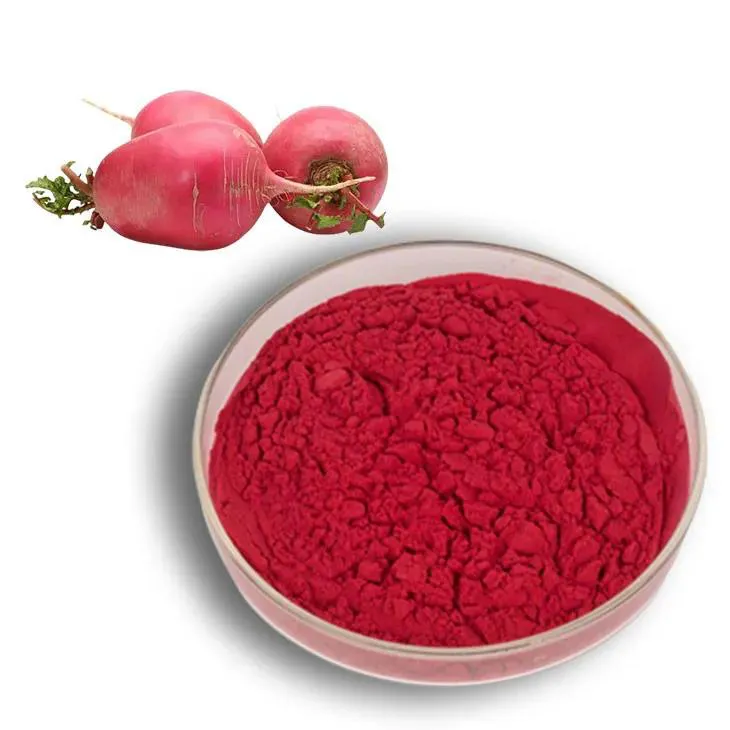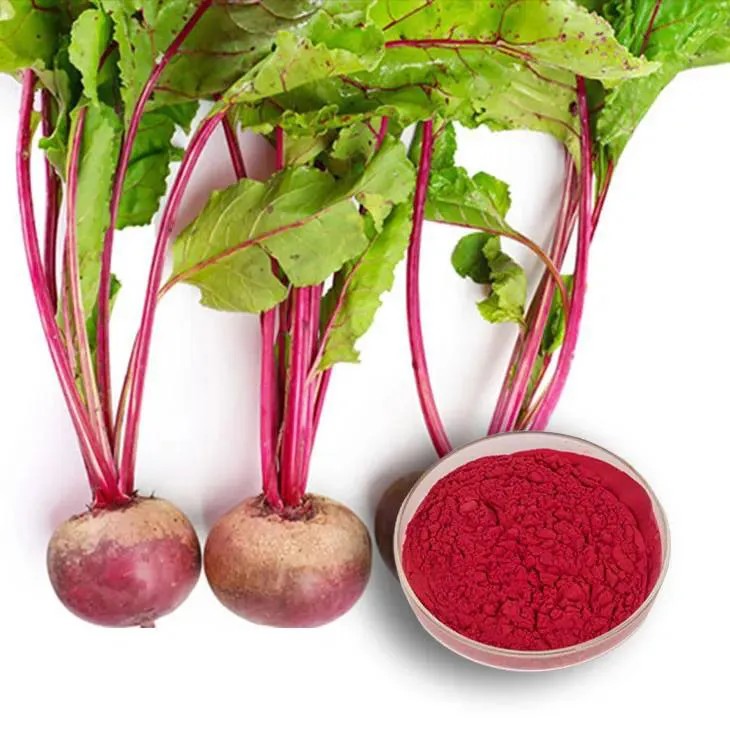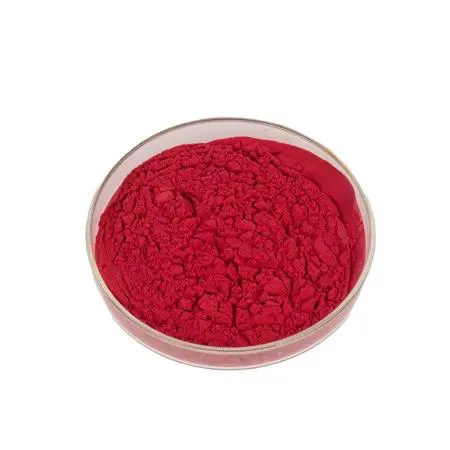- 0086-571-85302990
- sales@greenskybio.com
Navigating Safety and Allergies: A Guide to Enjoying Fermented Beetroot Juice Powder
2024-08-23

Introduction
Fermented Beetroot juice Powder has gained significant popularity in recent years due to its numerous health benefits. However, for those with allergies or concerns about safety, it is essential to have a comprehensive guide to ensure a safe and enjoyable experience. This article aims to provide in-depth information on the safety aspects of fermented Beetroot juice Powder, potential allergens, and valuable insights and tips to help readers make informed decisions.

Safety Aspects of Fermented Beetroot juice Powder
Production Process
Understanding the production process of fermented beetroot juice powder is crucial in assessing its safety. Fermentation is a natural process that involves the conversion of sugars into lactic acid by beneficial bacteria. This process not only enhances the flavor and nutritional value of beetroot juice but also helps to preserve it. During fermentation, the juice is typically pasteurized to eliminate harmful bacteria and yeasts, ensuring the safety of the final product.
Quality Control
Reputable manufacturers of fermented beetroot juice powder adhere to strict quality control measures to ensure the safety and purity of their products. This includes regular testing for contaminants such as heavy metals, pesticides, and mold. Additionally, they follow Good Manufacturing Practices (GMP) to maintain a clean and controlled production environment. Consumers should look for products that are certified by recognized organizations and have undergone thorough quality testing.
Storage and Handling
Proper storage and handling of fermented beetroot juice powder are essential to maintain its quality and safety. The powder should be stored in a cool, dry place away from direct sunlight and moisture. Once opened, it is recommended to store the powder in an airtight container to prevent exposure to air and moisture, which can lead to spoilage. When handling the powder, it is important to use clean utensils and avoid cross-contamination with other foods.

Potential Allergens in Fermented Beetroot Juice Powder
Beetroot
Beetroot is the primary ingredient in fermented beetroot juice powder and can cause allergic reactions in some individuals. Common symptoms of beetroot allergy include skin rashes, itching, swelling, and respiratory problems. If you have a known allergy to beetroot or any other member of the Chenopodiaceae family, it is important to avoid consuming fermented beetroot juice powder.
Added Ingredients
Some manufacturers may add additional ingredients to fermented beetroot juice powder for flavor enhancement or other purposes. These added ingredients can also cause allergic reactions in some people. Common additives include sweeteners, flavors, and preservatives. It is important to read the label carefully and avoid products that contain ingredients you are allergic to. If you have any doubts about the safety of a particular product, it is advisable to consult a healthcare professional or contact the manufacturer.

Insights and Tips for a Safe and Enjoyable Experience
Start with a Small Amount
If you are new to fermented beetroot juice powder or have concerns about allergies, it is recommended to start with a small amount and gradually increase the dosage. This allows your body to adjust to the new food and helps to identify any potential allergic reactions. Start with half a teaspoon or less and monitor your body for any adverse reactions such as itching, swelling, or digestive issues.
Read Labels Carefully
When purchasing fermented beetroot juice powder, it is essential to read the label carefully. Look for information about the ingredients, including any potential allergens. Make sure the product does not contain any ingredients you are allergic to and avoid products that have been processed in facilities that also handle allergens. If you have any questions about the label or the product, do not hesitate to contact the manufacturer or a healthcare professional.
Choose High-Quality Products
Opt for fermented beetroot juice powder from reputable manufacturers who follow strict quality control measures. Look for products that are made from organic beetroots and do not contain any artificial additives or preservatives. High-quality products are more likely to be safe and provide the maximum health benefits. You can also read reviews and testimonials from other consumers to get an idea of the quality and reliability of a particular product.
Store Properly
Proper storage is crucial in maintaining the quality and safety of fermented beetroot juice powder. Store the powder in a cool, dry place away from direct sunlight and moisture. If you live in a humid climate, it may be necessary to store the powder in the refrigerator to prevent spoilage. Additionally, make sure to keep the container tightly sealed when not in use.
Consult a Healthcare Professional
If you have a known allergy or are concerned about the safety of fermented beetroot juice powder, it is advisable to consult a healthcare professional. They can provide personalized advice based on your medical history and allergies and help you make an informed decision about whether to consume the product. A healthcare professional can also perform allergy tests if necessary to determine if you are truly allergic to beetroot or any other ingredients in the powder.

Conclusion
Fermented beetroot juice powder can be a delicious and nutritious addition to your diet, but it is important to be aware of the safety aspects and potential allergens. By following the insights and tips provided in this guide, you can safely enjoy the goodness of fermented beetroot juice powder while minimizing the risk of allergic reactions. Remember to start with a small amount, read labels carefully, choose high-quality products, store properly, and consult a healthcare professional if needed. With proper care and attention, you can incorporate fermented beetroot juice powder into your daily routine and reap its many health benefits.
FAQ:
What are the safety aspects of fermented beetroot juice powder?
The safety aspects include proper storage, ensuring the quality of the ingredients, and following recommended usage guidelines. It is important to choose a reliable product and store it in a cool, dry place.
What are the potential allergens in fermented beetroot juice powder?
Common potential allergens may include beetroot itself (for those with beetroot allergies), as well as any added ingredients such as preservatives or flavorings. It is crucial to read the label carefully.
How can one be aware of allergies when consuming fermented beetroot juice powder?
Read the product label thoroughly to identify any listed allergens. If you have known allergies, avoid consuming the product. Also, if you have a history of food allergies, it is advisable to consult a healthcare professional.
What are some valuable insights for enjoying fermented beetroot juice powder safely?
Start with a small amount to assess your tolerance. Observe any adverse reactions such as digestive issues or skin rashes. Additionally, combine it with a balanced diet and maintain a healthy lifestyle.
How does this guide help in making informed decisions about fermented beetroot juice powder?
By providing in-depth analysis of safety and allergen information, along with practical tips, the guide equips readers with the knowledge needed to make wise choices and enjoy the product safely.
Related literature
- Safety and Allergies in Fermented Foods" by [Author 1]
- "The Benefits and Risks of Fermented Beetroot Juice" by [Author 2]
- "Allergic Reactions to Beetroot and Related Products" by [Author 3]
- ▶ Hesperidin
- ▶ Citrus Bioflavonoids
- ▶ Plant Extract
- ▶ lycopene
- ▶ Diosmin
- ▶ Grape seed extract
- ▶ Sea buckthorn Juice Powder
- ▶ Fruit Juice Powder
- ▶ Hops Extract
- ▶ Artichoke Extract
- ▶ Mushroom extract
- ▶ Astaxanthin
- ▶ Green Tea Extract
- ▶ Curcumin
- ▶ Horse Chestnut Extract
- ▶ Other Product
- ▶ Boswellia Serrata Extract
- ▶ Resveratrol
- ▶ Marigold Extract
- ▶ Grape Leaf Extract
- ▶ New Product
- ▶ Aminolevulinic acid
- ▶ Cranberry Extract
- ▶ Red Yeast Rice
- ▶ Red Wine Extract
-
Genistein
2024-08-23
-
Black Rice Extract
2024-08-23
-
Hawthorn powder
2024-08-23
-
Saffron Extract Powder
2024-08-23
-
Peppermint Extract Powder
2024-08-23
-
Rose Hip Extract
2024-08-23
-
Hops Extract
2024-08-23
-
Yam Extract
2024-08-23
-
Rosemary extract
2024-08-23
-
Wheat Germ Extract
2024-08-23





















